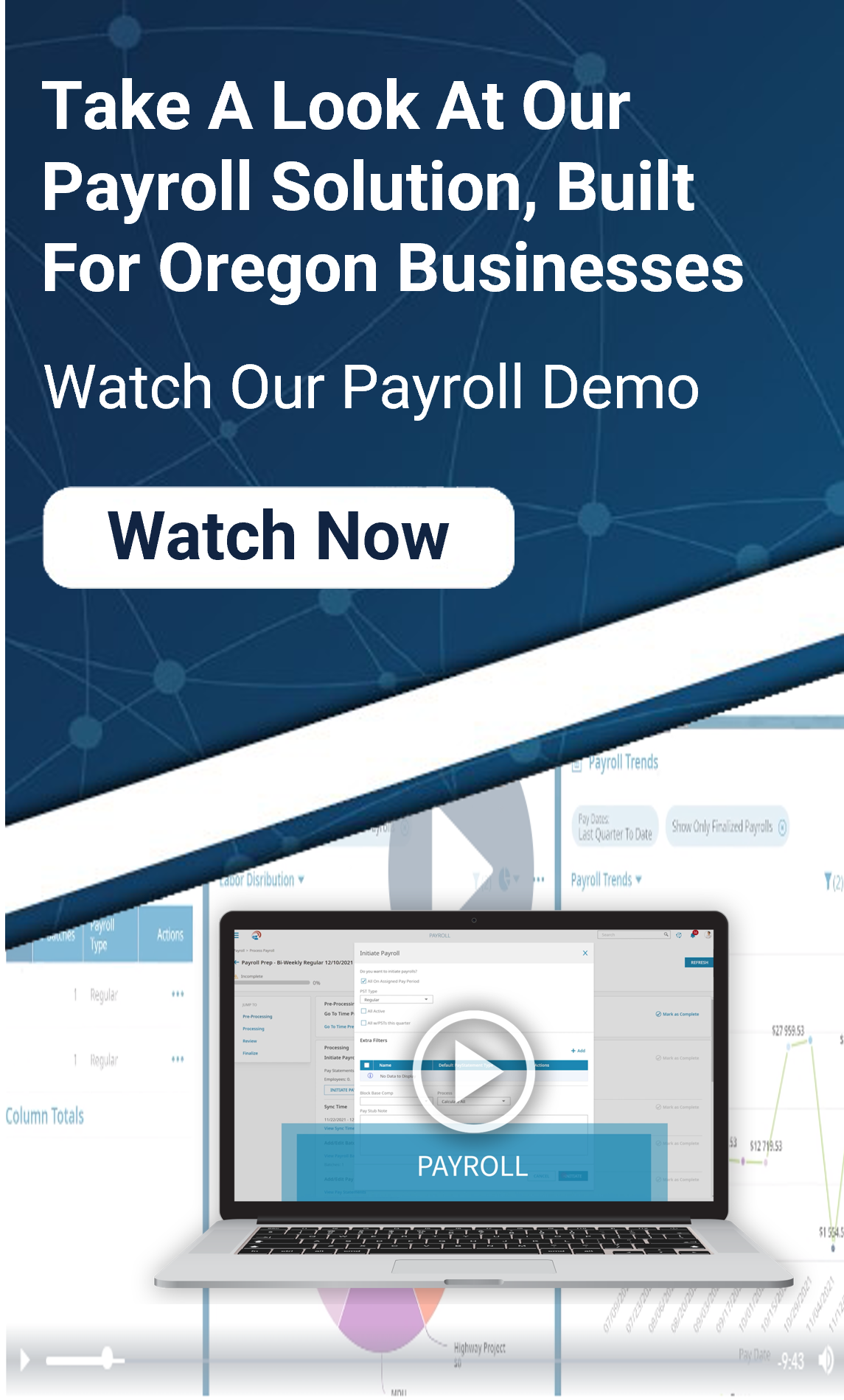Processing payroll in Oregon has a lot of moving parts. Before paying an employee in the state, you must consider several areas of Oregon Payroll Law, including the minimum wage, hours worked, overtime, allowed deductions, payroll tax, and more.
Oregon Paycheck Laws and Oregon Payroll Processing for 2024
Understanding federal, state, and even local payroll laws in places like Portland is essential to avoid disputes with employees and the government. Keep in mind that if you do not have the resources or bandwidth to understand the legislation or comply with it, an Oregon payroll service might be right for you.
And if you're business is constantly having issues with payroll, now may be the best time to switch payroll providers.
Here are vital items Oregon businesses need to know about processing payroll. Use this information for proactive compliance, the best way to stay out of trouble, and to be prepared for the BOLI investigation process and any investigations you may face.
Oregon Minimum Wage
While the current federal minimum wage is $7.25 per hour, Oregon minimum wage figures are much higher and can be dependent on a specific locale or city. As of July 1, 2023, minimum wage in Oregon increased to $14.20 per hour (this is the standard minimum wage rate).
There are other wage rates for special locations / areas in Oregon, which have also increased as follows:
- Portland Metro Minimum Wage: $15.45 per hour
- Non-Urban Minimum Wage: $13.20 per hour
Oregon minimum wage law requires you to pay the most beneficial rate to the employee, which is the state minimum wage. The minimum wage requirement applies to all paid workers, including minors and employees on official training.
2024 Update
Starting on July 1st, 2024 Oregon minimum wage will increase as follows:
- Standard Rate: $14.70 per hour
- Portland Metro Minimum Wage: $15.95 per hour
- Non-Urban Minimum Wage: $13.70 per hour
Oregon Wage and Hour Requirements
A workday, according to Oregon minimum wage law, is a fixed period of 24 consecutive hours. On the other hand, a workweek is a specified period of seven successive days that occurs regularly.
Businesses have to pay employees for all hours worked. Oregon's minimum wage law defines hours worked as all hours an employed person commits to their employer. This includes the time an employee is on duty at the employer's premises or engaged away.
Further, Oregon recognizes work requested as well as suffered or accepted unrequested work as hours worked. If an employer doesn't want a worker to perform work, the employer must ensure the employee doesn't do it.
Oregon Payroll Taxes
Oregon requires employers in or operating within Oregon to withhold tax from wages paid to residents working in or outside the state. They must also do the same for nonresidents who deliver services in Oregon.
An employer in Oregon needs to register for a business identification number (BIN) using this form, or can do so online using the Oregon Business Registry, before ever paying employees. Corporations without workers should have a BIN to report remuneration for corporate officers.
Oregon withholding taxes and federal taxes are due on April 30. Unemployment and transit taxes are due on the last day of the month following a calendar quarter. If you pay federal taxes electronically, you should do the same for your combined payroll taxes.
For more information on Oregon Payroll Taxes and Tax Rates, see the Oregon State website. Or for more information on ACA in Oregon specifically, see here.
Pay Deductions in Oregon
Oregon has strict rules governing how an employer can withhold or deduct part of an employee's wages.
As the employer, you can only make pay deductions in Oregon if:
- The state or federal law requires you to do so.
- For instance, there is a new Oregon Paid Leave Law requiring new payroll deductions.
- The employee has authorized a deduction by writing for their own benefit.
- The employee voluntarily authorizes a deduction for some item, provided you aren't the ultimate recipient of the money.
- The deduction is a garnishment under Oregon Stat. 18.736.
- A collective bargaining agreement in which you are a party authorizes the deduction.
- You're making the deduction upon a worker's termination to repay a loan you gave them.
As a result of the Oregon Retirement Plan Mandate, pay deductions will also include deductions for retirement benefits.
However, there are many instances where the state prohibits you from deducting or withholding any amount from an employee's wages. Examples include deductions to cover:
- Cash shortages
- Returned or dishonored checks
- Damaged or lost employer's property
- Tools, uniforms, and other items required for work
Oregon Pay Schedule Rules
Every employer in Oregon must establish and observe a regular payday when they must pay all employees the wages due to them. However, Oregon Revised Statute 652.120 allows you to enter into a written agreement with your workers to pay them at a future date.
Typically, the payday should not extend beyond 35 days from the day you engaged an employee or since the last regular payday. Employers are free to establish and maintain more frequent pay intervals. Employers should consider Oregon Predictive Scheduling Law when deciding what their pay schedule should look like.
Wage Payment Methods in Oregon
Oregon law has certain requirements regarding payment methods. You can pay your employees by cash, check, or direct deposit. A payment check should be redeemable at face value with no deductions by the employee's bank. If you want to pay via direct deposit, payroll card, ATM card, or any other electronic means, the employee must consent to it.
Electronic payment methods should allow the employees to withdraw their net pay once cost-free. A worker who wishes to revoke their consent to electronic deposits must issue you with a written notice. The revocation becomes effective 30 days after you receive it.
Oregon Employee Time Reporting Requirements
Oregon requires employers only to compensate workers for hours worked. Therefore, you don't have to pay an employee for showing up or reporting if they don't work. Additionally, you don't need to pay a worker the minimum number of hours if you dismiss them before completing their shift.
Here is a rundown of hours worked in Oregon.
Oregon Travel Time Regulations
Oregon payroll processing laws also cover when employees in Oregon need to be paid for travel time:
- Portal-to-portal travel
- Travel between worksites
- Special one-day assignments
- Overnight travel
- Mileage
Oregon Waiting Time Rules
If you engage employees to wait for work, you should consider the time as hours worked. An employee engaged to wait is typically under their employer's control and direction, preventing them from utilizing the time for their own tasks. Oregon labor law considers such a worker to be on duty.
Employers don't have to compensate employees who wait voluntarily without your engagement. An example is when you inform a worker that they are free and may leave the job until a specified time, but they choose to stay. However, you should relieve an employee long enough to allow them to go about their own business to consider them off-duty.
Oregon On-Call Time Guidance
On-call time means that an employee is not working, but he or she is ready for work immediately the employer contacts them. Therefore, the individual must stay within or near the workplace such that they can't use the time for other purposes.
If you keep a worker on call, you should count their time as hours worked when processing their payment. However, a worker who only needs to say where they are without necessarily staying at or near the employer's premises is not an on-call employee.
Meeting and Training Time in Oregon
Time spent attending meetings, training, lectures, and similar activities can qualify as hours worked depending on some conditions. As the employer, you don't have to count these hours in Oregon if:
- Attendance is not mandatory for the employee
- Sessions take place outside your regular work hours
- The activity is unrelated to the employee's job
- No productive work takes place during the meeting
Oregon Final Paycheck Requirements
As a result of Oregon At-Will Employment, employers should also be aware of Oregon Final Paycheck Law, since employees may be generally terminated at any time, and for any reason.
Payment for Terminated Employees
For companies that are discharging an employee or for a worker leaving according to a mutual agreement, companies are required to pay the employee their wages due not later than the end of the next business day after the separation date. The same applies to layoffs with no hope of return.
How Long Does an Employer Have to Pay You After You Quit in Oregon?
How you pay an employee who resigns or quits employment in Oregon depends on the underlying circumstances.
Employee Provides 48 Hour Notice
If an employee gives you a notice of at least 48 hours (excluding weekends and holidays), you must pay them on the last day of their employment.
Employee Provides NO Notice
If an employee resigns or quits employment without prior notice, you must pay them within five business days or on the next payday, whichever comes first. For workers who submit time records to enable their employers to determine their wages, the employer must pay the estimated wages within five business days.
Contracted Employees
A person employed under an unexpired contract with a definite engagement period might resign with or without notice. In that case, should pay all wages due not later than the next regular payday.
Oregon Statement of Wages
Employers in Oregon must provide employees with an itemized pay stub when paying wages. The statement should show and describe any deductions made from wages. You can attach the report to the paycheck or whatever payment document the worker receives.
Oregon Payroll Services in Portland
While there is certainly much to be aware of when it comes to processing payroll in Oregon, there's no better way to make it easy on your business than going to an Oregon Payroll company for help. GNSA's leading Oregon payroll solution can help streamline payroll processing, allowing you to focus on more strategic parts of your business.
Our PeoplePro Payroll Solution is an intuitive payroll reporting system that processes payroll in real-time for companies throughout Portland, Oregon, and throughout the great northwest. It brings more visibility into workforce productivity and labor costs across locations, departments, and / or jobs.
Start streamlining all your payroll processes, reduce errors, minimize compliance risk, control labor costs, and leverage the professional services team at GNSA to handle your payroll tax filing in Oregon or any other locations throughout the United States.
Download the PeoplePro Payroll Datasheet to learn more or view a PeoplePro Payroll Demo Video on-demand to see how easy processing payroll in Oregon can actually be.


.png)


